The views expressed in our content reflect individual perspectives and do not represent the authoritative views of the Baha'i Faith.
Spiritual growth and community building, as the first article in this series showed, can set the stage for building a just economy from the ground up.
Baha’is believe in what Abdu’l-Baha called “spiritual solutions to economic problems,” which center on applying the Baha’i principles to our human and economic issues:
… until now all proposed solutions have proved impracticable except the economic proposals in the teachings of Baha’u’llah which are practicable and cause no distress to society.
After years of community-building efforts by the global Baha’i community, this latent potentiality was unleashed by the Universal House of Justice in a 2017 letter announcing a new frontier of spiritually-grounded economic activity. This letter encouraged Baha’is to:
… consider the application of the [Baha’i] teachings to their lives and, using the opportunities their circumstances offer them, make their own individual and collective contributions to economic justice and social progress wherever they reside.
RELATED: My Brother’s Keeper: 9 Economic Tips for Uniting Humanity
This series of articles focuses on harmonizing spiritual values with economic action. The stories of those efforts can provide us with inspiration, begin to build a vision for a new kind of human economy, and allow us to gradually accrue knowledge and experience about the higher purposes of economic activity.
The first conversation in this series takes place with the owners of the family-run ice-cream cafe and retail space, Created Noble, located in the historically Black neighborhood of Atlanta’s Edgewood district. Beginning with creating their own Baha’i-inspired apparel during the Black Lives Matter marches of 2020, the mother and son team of Bahji Varner and Chuke Williams found themselves on an unexpected path to sharing empowering spiritual messages and enriching their community when approached to be the first foothold business in a Baha’i-owned social impact community called “BE on Edgewood.” While this developing enterprise will come to include a renovated space for community-focused institutions such as Parent University and a new center for the National Race Amity Institute, Created Noble provides a glimpse of what the future might hold.
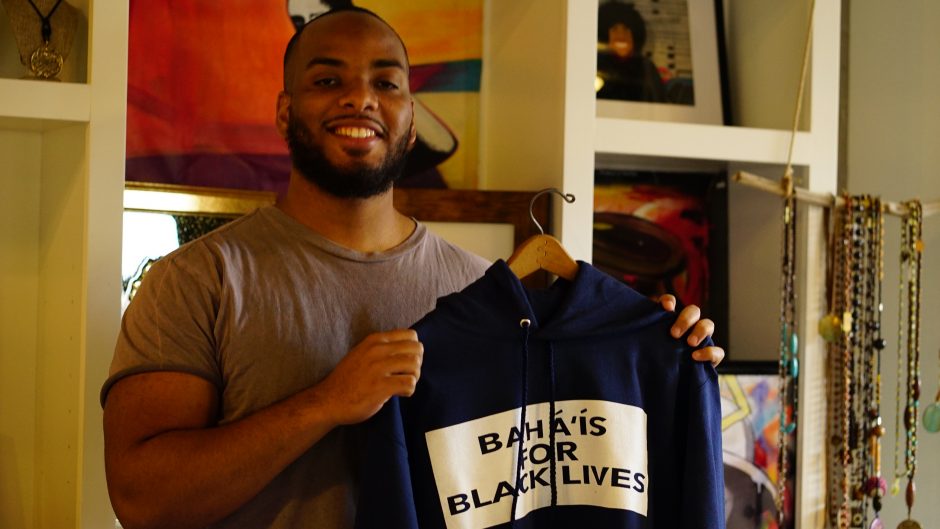
With time, Created Noble has increasingly become a center of activity in Edgewood; they have hosted weekly food and clothing drives, local vendor markets, workshops for kids, mural paint-ins, and elevated conversation nights. Still, the owners think they are not yet reaching the full potential of their inspiring vision for how their business might grow alongside their community and its needs.
I spoke with Bahji and Chuke about Created Noble’s unexpected beginnings, inspirational story, and what may be in store for the future.
Q: How did Created Noble first come into being?
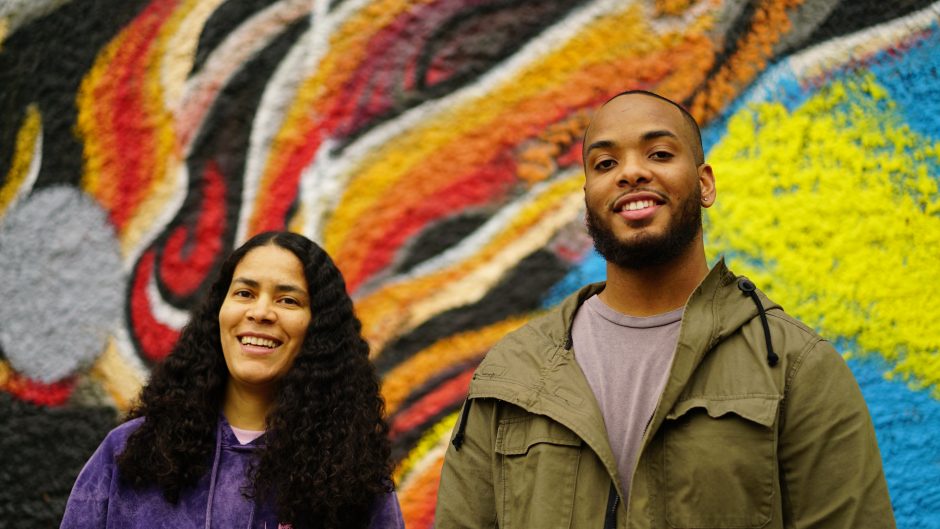
A: (Chuke) The idea wasn’t to launch a business by any means, it was more so we were participating in the marches of 2020 and we began to make apparel with Baha’i quotes on them. Basically you can say more things with a sign and a shirt than just a sign, and the conversation will continue after the marches. We wanted to tie the Baha’i writings into the dialectic; and Abdu’l-Baha’s “pupil of the eye” quote was everywhere at the time: “Thou art dark in countenance and bright in character. Thou art like unto the pupil of the eye which is dark in color, yet it is the fount of light and the revealer of the contingent world.”
We saw that as a way to contribute to the conversation in our community – which became part of the inspiration behind it, and then it was friends, and friends of friends, and that provided the momentum.
A: (Bahji) The experience of holding those Baha’is for Black Lives posters during the marches was so exciting and inspiring, the conversations that we had and the receptivity that we found. We were like “We have to get shirts out, we have to help other Baha’is have these conversations.” The way it switched [into a retail business] was we were on a race unity Zoom call, and I was presenting and my son called in and was responding to some questions. The owner of the BE on Edgewood property is a Baha’i, and she was watching and was really impressed with my son. She knew I also had a popsicle business and said “If you guys are interested, it would be great to have your family as the first tenants,” because this one space was ready, and the rest is coming. We consulted and prayed and were like yeah! It was not premeditated or planned so we are learning as we go.
Q: With time, how has your business developed and come to address the needs of the community?
A: (Bahji) We were thinking when we first started, “How can we serve the community and relate in a culturally appropriate way?,” because the neighborhood is a very culturally-rich, historically Black area but it’s going through gentrification. One street over, where the MLK Center is, was known as the Black Wall Street of Atlanta, and there’s a lot of mixed feelings about gentrification in that area, so we wanted to really celebrate Black culture. We looked at the Kwanzaa principles, some of which are faith, collective work and responsibility, and self-determination, and looked at developing different activities that are in line with those spiritual principles. The letters from the [Universal House of Justice] are also always talking about creativity and the arts, and how important those are, so that’s how we thought through the different activities that we wanted to do.
A: (Chuke) In another way, to the wider community serendipity is the word we often use, but in a Baha’i context I think the word is confirmation. We could try to have a strategic rhyme or reason to how we are moving, but a lot of things just fell into place for us; the right parties were finding us and the right protagonists came along to collaborate with us. You say how we got involved, well it involved us, honestly. We are here, there is this amazing space, how can we just be conduits and how can we allow this thing to be what it is?
Q: Sounds like Created Noble has really brought people together – tell me more about that.
A: (Bahji) It has been insane the confirmations and the way people have shown up and offered to serve in different ways. As an example of people coming to us just offering things, this artist said “Hey can I do a mural on your wall?” He had a design and we were like “Can we give you a quote and you come up with something?” We gave him the Baha’i “pupil of the eye” quote and what he came up with was a mural of all different-colored people holding up this banner saying “Unity in our Community.” He came in and wanted to do that for free.
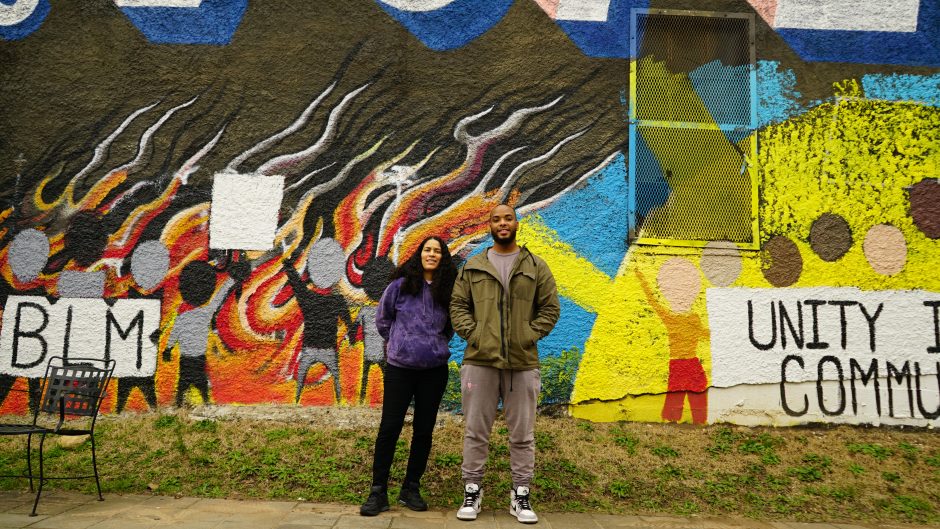
A: (Chuke) Even the painting of the mural was a community painting. We had kids and all different kinds of folks coming to paint the mural. We had people off the street, students, and probably around 40 to 50 people. Another example, the regular Thursday food and clothing drive, has seen all different kinds of people. We have people from different walks of life serving alongside each other and growing relationships that they may not have had otherwise. I think the potentiality hasn’t entirely been seen yet because of the pandemic, but we have also had producer battles with local beatmakers, art nights with outdoor galleries, workshops to teach video production to kids, and of course, the vendor markets.
Q: That’s incredible! What do you think attracts people to the space and to be of service?
A: (Chuke) There are some things baked into the relationship we have here. Both our and our landlord’s values are inspired by Baha’i principles – that’s the structure of BE on Edgewood. Our commercial lease has stipulations of no alcohol and smoking, and we play clean music, we call it a family-friendly environment that we cultivate. People walk in and just say “This is different, it’s positive.’’ It’s not strategic messaging, it’s a vibe.
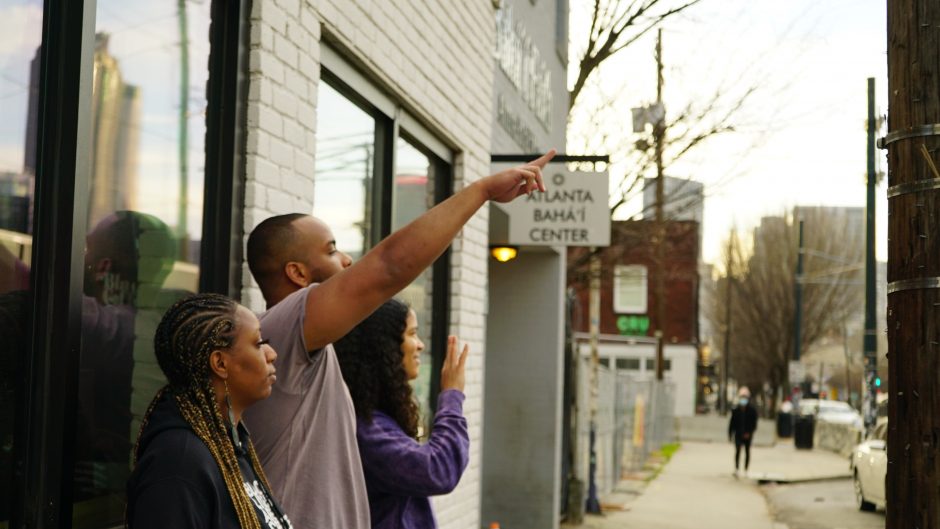
A: (Bahji) Honestly, I think it’s also because we are next door to the Baha’i Center. The Atlanta Baha’i Center was the first building created in the city for interracial meetings, and this is a story we often share. It was dangerous for them to have interracial Baha’i gatherings at the time, the KKK even showed up once. The Baha’is rented a space for a while and then this Black Baha’i, Leroy Burns, who had bought this property to build a house for him and his wife, had a dream of Abdul-Baha and he said “You have a house, I have none.” He woke up from that dream and decided he was going to build the Baha’i center. So it’s a really awesome story. Spiritual seeds have been sown.
Q: It’s interesting what you said about spiritual principles being “baked into the structure” of your business. Tell me more about how you ground your business in spiritual values.
A: (Bahji) So the first thing we did, when we started making the shirts, we decided that we were going to send 19% of our profits to the Baha’i fund – it was something we wanted to do. That’s the same percentage that we give to artists and creators whose products we consign, we keep 19% and we give the other 81% to them..
A: (Chuke) To give you an idea, industry standards are 30 to 33% off the top, so oftentimes it’s a more affordable price. Then you look at our vendor markets, which charge $40 for a five-hour shift, whereas other markets at cheapest are $100 to $200. Across the board a lot of our things are more affordable than typically they would be elsewhere.
That’s one thing, and also the products that we give a platform to are all Baha’i-inspired as well. On the street we are at, pretty much every establishment is like “You’re going to have parties, right? You’re going to have hookah and alcohol?” From a pragmatic business perspective it would be a very very lucrative thing to host those parties, but we always tell people before they come out that we have a no-alcohol policy. So we are not bringing in any and everything, only what feels like is in alignment with positivity or spirituality.
A: (Bahji) Just to give you an idea, we turned down two parties that would have paid $2,500 just this week. We are surrounded by bars and clubs, which is one reason that a Baha’i family wanted to buy this property to preserve the nobility of the space around the Baha’i center. So our shirts are out there, and people are having conversations and reading Baha’i quotes. Most of our business has not been with Baha’is, and I’ve sold more Baha’is for Black Lives shirts to people who are not Baha’is.
Q: Created Noble is a growing business – so what does success mean to you as the owners?
A: (Chuke) Success looks like being able to be a part of the local economy and providing jobs for people. So far it’s been odd jobs here and there because people are trying to get some bread, but in the long term, I think just providing employment for people. In a larger context of people having trouble finding employees, we have had a lot of inquiries – at least 50+ inquiries, because it seems like somewhere they would want to work, so whenever we are ready to hire we would have no issue. I also think success means being able to spread the message, spread the positivity, and be a robust full-fledged force in the community.
A: (Bahji) I want to see people there like at a coffee house, always full of people, and that’s been affected by the pandemic. I want to see people talking about the Baha’i teachings, and all these wonderful things people are doing that come through, for it to be a hub for community building and meaningful conversations, and be able to pay ourselves a salary. We have a vision of people just being there to network, have meaningful conversations, and build community.
Chuke: And we are just the first representation of what BE on Edgewood will look like down the road. Our role as the first foothold tenant delivers the first hint at what is coming down the road, because there will be diverse occupants, different organizations, performance centers, and lots more to come.
Q: What do you hope other businesses can learn from your journey as a business?
A: (Bahji) Just having faith, having faith that people are ready, and being in a mode of learning.
RELATED: Agriculture: the Secret Ingredient to Global Peace and Prosperity
Created Noble is just the beginning of something larger, perhaps a growing economy that embraces local community, serves its needs, and puts spirituality at the center of all they do. We can each learn from the way Bahji and Chuke have adopted a humble posture of learning and embraced the unexpected that comes their way. Bahji is now starting a non-profit afterschool program in collaboration with many of the people who have walked through the doors of Created Noble that will include among its services a Junior Youth Group. Chuke is the Director of Operations of BE on Edgewood and is fully devoted to building up Created Noble as he works six days a week.


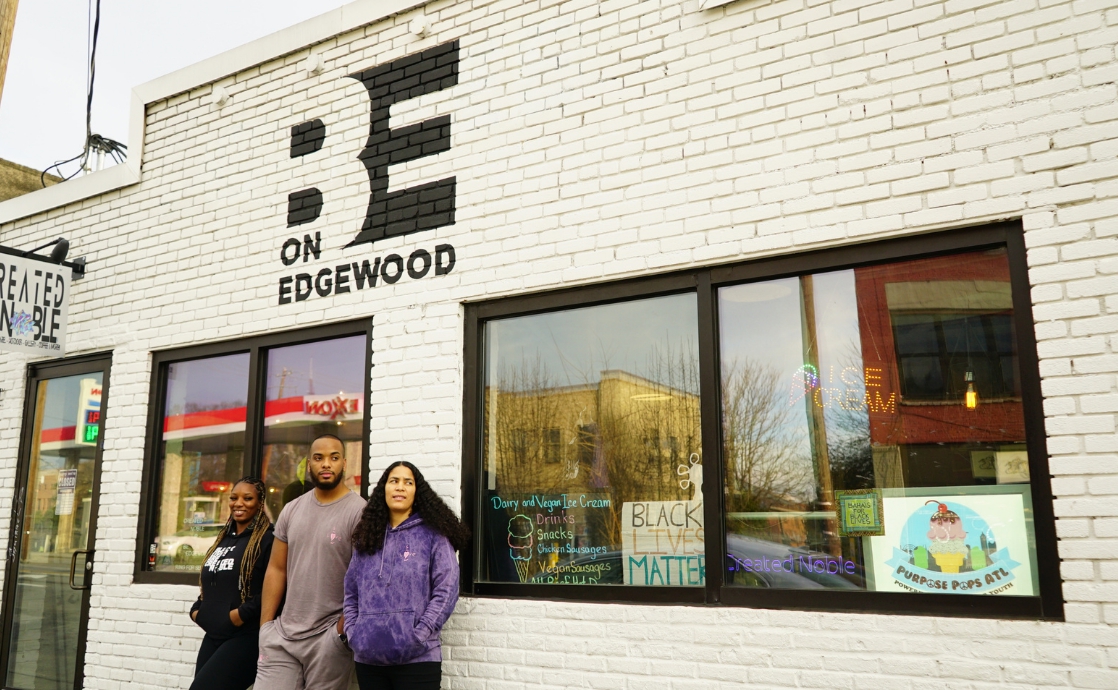

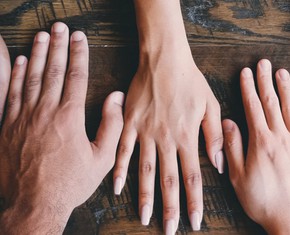











Comments
Sign in or create an account
Continue with Googleor